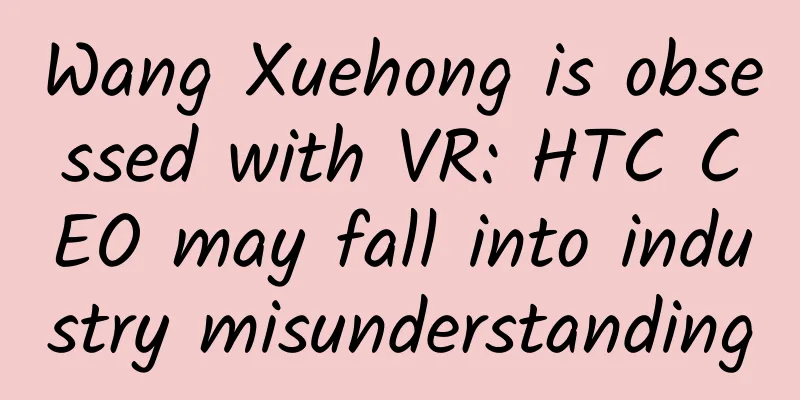Wang Xuehong is obsessed with VR: HTC CEO may fall into industry misunderstanding

|
At the recently concluded MWC2016, VR once again became the focus of the industry after CES2016 at the beginning of the year. HTC, which is struggling in the smartphone industry, once again triggered a debate in the industry about its future prospects in the VR market and its relative importance to the current smartphone business due to the release of the launch price of its VR device HTC Vive. However, judging from the recent remarks of HTC's head, Cher Wang, it is possible that HTC may fall into a new industry misunderstanding. First, let’s take a look at what Wang Xuehong has said recently? HTC CEO Wang Xuehong said in an interview with the British Daily Telegraph: "Now we have become more realistic, and HTC will invest its energy in more areas. Although smartphones are important, their importance cannot be compared with smart wearable devices and VR devices." When the media asked Wang Xuehong which is more important, HTC's VR business or its mobile phone business, her answer was that both are equally important. On December 18 last year, she also denied that HTC had strategically abandoned its mobile phone business, and described HTC Vive as an extension of its mobile phone business. Unconfirmed insider information in the industry is that when you report to Wang Xuehong about work related to the mobile phone business, she is reluctant to listen. But when you talk to her about VR and Vive headsets, she gets very excited. We have only excerpted some media (including domestic and overseas) about Wang Xuehong's tone on VR business. At least put it on the same level of importance as smartphones. So the question is, is the VR market really as good as Wang Xuehong sees it, or is there any factor that HTC can succeed in the VR industry at least in the early stage? Overall, the VR market is still in its early stages. Even if it can usher in a big explosion in the next few years, it should be noted that many statistical agencies have given different figures for the size of the future VR market. The most conservative estimate is that its market size in 2020 will only be US$2.8 billion, while the most optimistic estimate is that by 2020, the VR market value will reach US$70 billion (including US$20 billion in the hardware equipment market and US$50 billion in the software market). Here, we might as well compare the most optimistic forecast with the smartphone industry where HTC is struggling. According to statistics, the smartphone market last year had a market size of US$400 billion. As for this year, according to research firm IHS, with the revenue of the mobile phone industry only growing by 1.1% this year, the entire market size will still reach US$373.1 billion, which means that even if the growth rate of the smartphone industry slows down, its market space is much larger than VR, at least in the next few years. No wonder some analysts in the industry believe that Wang Xuehong's obsession with VR is like "throwing away the watermelon to pick up the sesame seeds" for HTC. More importantly, even if Wang Xuehong insists on "throwing away the watermelon to pick up the sesame seeds", the "sesame seeds" may not be so easy to pick up for HTC. Why do you think so? As we all know, in the current VR market, VR manufacturers that are as famous as HTC VIVE include Facebook, Samsung, Google, and Sony. And these manufacturers have certain advantages over HTC. For example, in terms of developer application support for the entire future VR ecosystem. According to official statistics from GDC, a survey of 2,000 developers showed that most of them chose Facebook's Oculus VR as the preferred platform for developing applications, with Oculus accounting for 19%, followed by Samsung Gear VR at 8%, Google Cardboard at 7%, HTC Vive and Sony at 6% each. Among developers who are ready to "try" in the future, the proportion of choosing Oculus Rift is as high as 77%, followed by Google Cardboard at 46%; Samsung Gear VR at 31%; Sony's PlayStation VR at 21%; and HTC Vive at 19%). It is not difficult to see from the above statistics that among the current five mainstream VR manufacturers, HTC is at the bottom in terms of developer support, which is the most critical in the early stages of the development of the ecosystem. In addition to the ecosystem, HTC does not have an advantage in the initial equipment matching. For example, the current stock of Sony PS4 is 36 million units, which is almost three times the number of PCs that meet the requirements, and this number is still growing rapidly. This is the main reason why the outside world believes that Sony's PlayStation VR may be the first to succeed in the early stages of VR development. Samsung's sales of Gear VR devices, which are mainly for mobile VR experience, should not be underestimated, given its huge user base in the smartphone market. In other words, compared with Sony and Samsung, despite the different VR positioning, HTC does not have a user base and equipment holdings that match or can be leveraged. Finally, the price. After Facebook's Oculus announced the price of its Rift VR device at $599, HTC also announced the price of its virtual reality helmet HTC Vive at $799 at the recently concluded MWC2016, which is more expensive than the Oculus Rift, which has been criticized for its price and starts at $599. Although Wang Xuehong explained the reason for the high price from the perspective of experience and configuration, the industry knows that in order to achieve the best experience of Wang Xuehong or to give full play to HTC Vice, a matching PC is indispensable, so how much should such a PC cost? At the CES exhibition at the beginning of the year, HP launched the ENVY Phoenix, the first "official certified virtual reality dedicated" gaming PC for HTC VIVE. This gaming PC has a built-in 2TB hard drive, an Intel Core i7 K series processor (with HP's overclocking function), and users can choose AMD or NVIDIA graphics cards according to their own needs. Users can choose NVIDIA GeForce GTX 980 Ti or AMD Radeon R9 390x at the highest price, starting at $1,699.99. The sum of the two will reach about $2,500. If the industry said that only about 1% of the current PC configurations meet the hardware requirements required for VR experience such as Oculus Rift and HTC Vive, which rely on PC devices (average price in the VR experience), and are considered by the industry to be a barrier to popularization, then this barrier is more obvious in HTC Vive. That is, the overall price of PC+VR equipment is about $400 higher than that of Oculus Rift of the same level. Speaking of price, we have to mention Google's Cardbaord, which is said to have sold over 5 million units, and its biggest killer is price. Compared with other virtual reality devices on the market, Google's use of cardboard has brought it extremely low cost investment. It is even cheap enough for The New York Times to send this device to its subscribers, and it can also be well integrated with existing software that users are familiar with. Although strictly speaking, Cardbaord cannot be regarded as a real VR device, at least there is a big gap compared to HTC Vive, but as an industry in its early stages of development and has not been proven to be a rigid demand of the market and users, the role of price is extremely critical. Looking back at HTC's rise and fall, in addition to the so-called innovation, the neglect or inappropriate marketing was also the main reason why HTC was overtaken by the marketing expert Samsung in the mobile phone market and eventually declined. In the new VR industry, in addition to the above factors, HTC's weak marketing in the smartphone industry has not changed. This has been shown in the early marketing of VR, especially compared with its old rival Samsung. For example, at the 88th Academy Awards this year, the gift package included a pair of Gear VR and a matching Samsung smartphone, which was pre-installed with WeVR content, including the popular VR films "Waves" and "Hard World for Small Things". Similarly, at the recently concluded MWC2016, Samsung released its new Galaxy S7 mobile phone through virtual reality (VR) technology at the press conference. In order to allow everyone at the press conference to experience the VR effect firsthand, Samsung prepared a pair of its own Gear VR glasses on each seat and invited Facebook CEO Zuckerberg to speak for it. In contrast, we have not yet seen any impressive marketing events that Wang Xuehong's obsession with VR has left on the industry and the market. In summary, we believe that Wang Xuehong's obsession with VR has once again led her into a new industry misunderstanding, which has led to her blindness and self-confidence. In this blindness and self-confidence, HTC, whose main business is still smartphones, had a cumulative revenue of NT$121.684 billion (approximately RMB 24.07 billion) last year, a year-on-year decline of 35.2%. In December of the same year, the revenue was NT$6.516 billion (approximately RMB 1.29 billion), a decrease of 36.6% from the previous month and 57% from the previous year. This made HTC's gross profit margin and loss per share the lowest financial data since its listing in 2015. In January of this year, HTC's revenue was NT$6.48 billion (approximately RMB 1.27 billion), a year-on-year decline of 47.23% and a month-on-month decrease of 0.2%. In the absence of main models, HTC's revenue in January hit a new low in 10 years. This means that in the future, HTC’s smartphone business will find it difficult to provide good support for HTC’s transformation (such as VR devices and ecosystems). On the contrary, investment in VR will further increase HTC’s pressure, resulting in “losing both the watermelon and the sesame seeds”. As a winner of Toutiao's Qingyun Plan and Baijiahao's Bai+ Plan, the 2019 Baidu Digital Author of the Year, the Baijiahao's Most Popular Author in the Technology Field, the 2019 Sogou Technology and Culture Author, and the 2021 Baijiahao Quarterly Influential Creator, he has won many awards, including the 2013 Sohu Best Industry Media Person, the 2015 China New Media Entrepreneurship Competition Beijing Third Place, the 2015 Guangmang Experience Award, the 2015 China New Media Entrepreneurship Competition Finals Third Place, and the 2018 Baidu Dynamic Annual Powerful Celebrity. |
<<: Visiting the set of "Lip Sync Battle" to see how small but exquisite variety shows break through
Recommend
5 key points for beginners to do Tik Tok live streaming!
On April 15, "Overseas Flight Attendant Ling...
The advertising volume is not ideal? Facebook advertising optimization in practice!
There are thousands of problems with advertising,...
More than 60 tools for event operation and promotion, a must-have!
To organize a good event, it often goes through t...
China Automobile Dealers Association: Consumer Evaluation Report on China's Automobile After-sales Service Quality in the Fourth Quarter of 2019
On January 2, the 2019 fourth quarter Chinese aut...
How much does it cost to join Ningbo’s flash sale mini program? Ningbo Seckill Mini Program Franchise Price Inquiry
How much does it cost to join a flash sale mini p...
20 satellites in one rocket! The successful launch of Jielong-3 injects new momentum into commercial aerospace!
At 3:24 on December 6, the Jielong-3 carrier rock...
How exactly is an iPhone locked remotely?
[[151329]] Since the second half of last year, iP...
When Apple Watch is pre-sold, let's talk about Xiaomi bracelet
At a time when Apple Watch is being pre-ordered a...
How to place Kuaishou information flow ads!
As one of the giants of short video platforms, Ku...
How to quickly build a user growth system from 0 to 1?
The user growth system has always been a necessar...
Five years ago today, Chang'e 4 flew to the far side of the moon! How was the "auspicious date" for the mission selected?
In the early morning of December 8, 2018, accompa...
How to successfully conduct marketing promotion during the Spring Festival? This wave of explosive marketing cases is worth collecting!
With the Spring Festival approaching, brand owner...
How does the blood in the legs and feet overcome gravity and flow to the heart?
Who can fight against the gravity of the earth? B...
Tingyun CTO: AWS and Tingyun join hands to create a domestic cloud + APM model
[[124682]] Recently, the AWS Technology Summit wa...
Chen Zhidao·Million-dollar anchor operation employment class training video
Chen Zhidao·Million-dollar anchor operation emplo...









